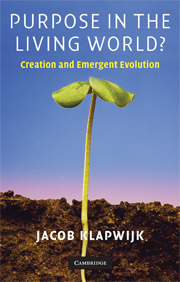Book contents
- Frontmatter
- Contents
- List of figures
- Preface
- Introduction
- 1 Does life on earth have a purpose?
- 2 Creationism, Intelligent Design, and Augustine's idea of time
- 3 Darwin, neo-Darwinism, and the naturalistic continuity claim
- 4 Miller's pre-biotic broth and the premises of evolutionism
- 5 A cold shudder along Darwin's back
- 6 The emergence theory of Morgan and Alexander
- 7 Luctor et emergo: what is emergent evolution?
- 8 Toward a general theory of emergent evolution
- 9 Hominization and the philosophy of mind
- 10 Augustinian faith and evolutionary science
- 11 The organism is a whole. The world is a habitat
- 12 The slumbering temptation of essentialism
- 13 Questions surrounding the emergence process
- 14 Enkapsis in nature. Is there an Omega point?
- Bibliography
- Index
2 - Creationism, Intelligent Design, and Augustine's idea of time
Published online by Cambridge University Press: 05 June 2012
- Frontmatter
- Contents
- List of figures
- Preface
- Introduction
- 1 Does life on earth have a purpose?
- 2 Creationism, Intelligent Design, and Augustine's idea of time
- 3 Darwin, neo-Darwinism, and the naturalistic continuity claim
- 4 Miller's pre-biotic broth and the premises of evolutionism
- 5 A cold shudder along Darwin's back
- 6 The emergence theory of Morgan and Alexander
- 7 Luctor et emergo: what is emergent evolution?
- 8 Toward a general theory of emergent evolution
- 9 Hominization and the philosophy of mind
- 10 Augustinian faith and evolutionary science
- 11 The organism is a whole. The world is a habitat
- 12 The slumbering temptation of essentialism
- 13 Questions surrounding the emergence process
- 14 Enkapsis in nature. Is there an Omega point?
- Bibliography
- Index
Summary
Creationism presents itself, and has done so for over a century, as a biblically oriented critique of Darwinian evolution theory. It wants to expose its naturalistic and atheistic premises. Rightly so, for in the evolutionary camp we find all kinds of thinkers who give evidence of dogmatic prejudices. How creationists present themselves is another story, on which we shall focus in this chapter (section 1). As we continue, we shall turn our attention to the Intelligent Design movement (section 2), and to the scholastic tradition out of which this movement has arisen (section 3). Then we shall consider the significance of the creation account in Genesis and of creation narratives in general (section 4). Finally in this chapter, we shall reflect on the Church Father Augustine and his pioneering interpretation of time as a creature of God (section 5).
CREATION AND CREATIONISM
Creationism I take to mean the view that the creation story in Genesis is not only a believing witness regarding God as the source of all being and the origin of all that lives, but also a scientifically reliable representation of the manner in which He brought the world and the diverse forms of life into being at the beginning of time. That the text in Genesis has also been shaped by the ancient, oriental world picture that prevailed at the time the narrative took shape, creationists will only admit with much hesitation and reserve.
- Type
- Chapter
- Information
- Purpose in the Living World?Creation and Emergent Evolution, pp. 9 - 36Publisher: Cambridge University PressPrint publication year: 2008

